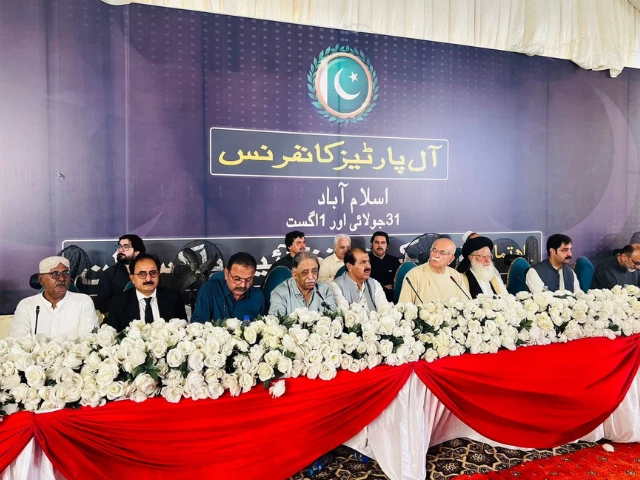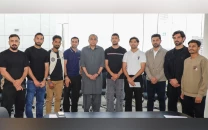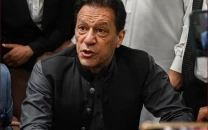APC calls for abolishing SIFC, 26th Amendment, creating new 'Charter of Democracy'
Alliance also calls for international action on key issues, demands accountability for Netanyahu's war crimes

Opposition leaders urged all political parties to come together to establish constitutional norms for inter-party relations, calling for a new democratic framework, systemic reforms, and an end to political victimisation and institutional overreach.
An All Parties Conference (APC), organised by Tehreek Tahafuz Ayin-e-Pakistan (TTAP), was hosted at former senator Mustafa Nawaz Khokhar’s residence in Islamabad on Mahmood Khan Achakzai’s invitation. The conference brought together leaders of Pakistan Tehreek-e-Insaf (PTI), Pashtunkhwa Milli Awami Party (PkMAP), former senators, legal experts, and civil society groups.
Issuing a wide-ranging manifesto, the APC demanded the dissolution of the Special Investment Facilitation Council (SIFC) and the 26th Amendment, immediate release of political detainees, lifting of media restrictions, and the referral of Israeli Prime Minister Benjamin Netanyahu to the International Criminal Court (ICC).
Read More: Opposition demands end to 'engineered politics'
Reading out the joint declaration, Khokhar condemned “escalating authoritarian practices” and demanded immediate release of Imran Khan and Bushra Bibi, with expedited hearings in the Islamabad High Court and Supreme Court.
He described the sentencing of dozens of PTI activists and opposition lawmakers a day earlier as a “black day” in democratic history, asserting “the hybrid regime wants the complete elimination of opposition in the country.”
Delegates also called for the creation of a new 'Charter of Democracy' reaffirming the supremacy of the 1973 Constitution, rule of law, judicial independence, and the establishment of an impartial and autonomous Election Commission.
A declaration warned: “As a result of successive assaults by the hybrid regime, the Constitution of Pakistan—including the fundamental rights in Articles 8 to 18—and the parliamentary democratic system have been rendered meaningless.”
Also Read: FO slams India's 'Operation Mahadev' as 'entirely fabricated'
The conference further demanded abolition of SIFC, calling it unconstitutional and in violation of the 18th Amendment. “SIFC is contrary to the spirit of the 18th Amendment and the Constitution. We demand its dissolution and cancellation of plans to transfer millions of acres of land—acquired in the name of corporate farming—to Green Initiative Company.”
Criticising civil–military interference, the APC accused federal and defence institutions of undermining civilian agencies, eroding public trust in law enforcement and the justice system. It demanded immediate reforms and restoration of confidence in the judiciary.
Addressing judicial independence, the resolution declared: “Following the 26th Constitutional Amendment, judicial independence has been reduced to a slogan and is effectively nonexistent in Pakistan. Kangaroo courts are now serving establishment interests; regular courts serve select individuals, while the chief justice has become a symbolic figurehead.”
To reverse this, the conference called for full repeal of the amendment, ending all interference, and establishing an impartial system for judicial appointments. “To restore the sanctity of the judiciary… the complete repeal of the 26th Constitutional Amendment is necessary,” it said.
Also Read: Imran's sons await visa approval, says Aleema Khan
On provincial autonomy, the APC demanded that mineral resources in Balochistan, Khyber-Pakhtunkhwa, and Gilgit‑Baltistan remain under local control, declaring any legislation or contracts made without provincial consent as null and void.
The declaration also demanded release of missing persons in Balochistan and K‑P via court appearances, immediate dissolution of illegal private militias alleged to have establishment backing, and release of political prisoners. It insisted on the constitutional right to fair trials.
It further called for removal of restrictions on pilgrims (Zaireen) from Balochistan heading to Iran and Iraq, terming bans a violation of religious and human rights, and demanded greater local involvement in managing border areas adjacent to Iran and Afghanistan.
Also Read: Five cops martyred as Katcha bandits attack check post in Rahim Yar Khan
Promoting transitional justice, the APC proposed a Truth and Reconciliation Commission modelled on South Africa, stating: “Every institution or individual who, from the founding of Pakistan until today, has played any role against democracy, the rights of the people, or the Constitution must voluntarily appear before this commission and confess to their crimes and errors.”
The resolution emphasised promoting democratic culture and inter‑party consultation to curb political victimisation.
Voicing concern over Pakistan’s socio‑economic situation, the APC highlighted that around 45 per cent of Pakistanis live below the poverty line, salaried purchasing power has declined by 58 per cent, overall unemployment stands at 22 per cent and youth unemployment exceeds 30 per cent.
Finally, the opposition urged the K‑P government to comply with the Peshawar High Court’s verdict striking down the FATA‑TOF regulation and to withdraw its appeal in the Supreme Court.


1733130350-0/Untitled-design-(76)1733130350-0-208x130.webp)


















COMMENTS
Comments are moderated and generally will be posted if they are on-topic and not abusive.
For more information, please see our Comments FAQ